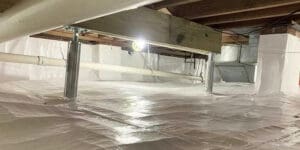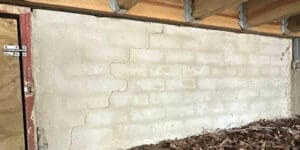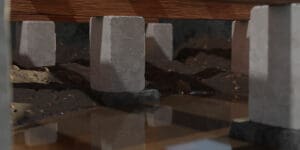Bricks are made from rugged, baked clay that has been tightly compressed for strength. Despite their compression, bricks do not absorb impact well and are not flexible. This means that as your house settles, the bricks are more likely to crack rather than remain solid.
Minor settling is nothing to be concerned about; all houses settle to some extent. The freeze-thaw cycles and differences in soil moisture content exacerbate the situation. In extremely wet or dry conditions, bricks can crack.
Inspect your brickwork or masonry for cracking, spalling, and other changes if you’re worried about cracks. Minor problems, such as cracks in the exterior brick, are usually avoidable with proper drainage.
Check the grading around your foundation, the gutters for obstructions, and the downspouts to ensure they are draining away from the house. This preventative maintenance safeguards the integrity of your foundation as a whole.
Different Types of Cracks in Brick
At HydroHelp911, we provide brick crack repair solutions tailored to your specific requirements. Every home and homeowner is unique, and they are treated as such! What follows is a quick rundown of what your brick crack could mean and how you can fix it.
HORIZONTAL CRACKS IN BRICK WALL
Horizontal cracks can be caused by various factors, some of which are foundation-related and others not. As a result, a horizontal crack may form when:
- The brick wall is being pushed against by dirt or wind.
- Moisture is rife as a result of clogged gutters or unresolved flood damage.
- The soil beneath the foundation is brittle.
Are you noticing horizontal cracking on one of your crawlspace or basement foundation walls? If this is the case, don’t hesitate to contact foundation repair and waterproofing experts, HydroHelp911, right away. Due to soil pressure, the foundation may buckle, and a horizontal crack may indicate a looming collapse. Horizontal brick cracks imply that a wall is about to collapse.
STAIR-STEP CRACKS IN BRICKS
Stair-step cracks are aptly named and are the most commonly reported type of brick crack by homeowners. Since the mortar is not as robust as brick, a stair-step crack is a diagonal, right-angle crack that traverses through the mortar surrounding the brick. The resulting damage resembles an up-and-down staircase. According to foundation repair experts, a stair-step crack will usually point to the sinking or settling area of the foundation.
Stair-step cracks in the brick are frequently caused by uneven, moisture-related foundation settling.
VERTICAL BRICK CRACKS (EXTERIOR)
Vertical cracks in the exterior of a brick home could be an indication of foundation settlement. Vertical cracks will differ depending on the material of your foundation (basement, crawlspace, concrete slab-on-grade, etc.). Small, thin vertical brick cracks can appear shortly after a house is built and can be traced back to foundation settlement. Although these cracks are usually minor, they should be examined by a brick crack repair professional. On the other hand, wide vertical brick cracks are a warning sign of a foundation issue. Wide brick cracks are frequently variable in size from one end to another.
VERTICAL BRICK CRACKS (INTERIOR)
Vertical cracking is commonly caused by brick expansion. Bricks can expand in size when exposed to humidity. Bricks can cause cracking at wall seams as they age. Vertical cracking in an interior wall is not usually an indication of foundation problems. Instead, it indicates that the builder did not leave sufficient space between the bricks to allow thermal expansion.
Causes of Cracks in the Bricks by HydroHelp911
According to foundation repair experts, any external force can influence brick cracking. Some are caused due to nature, while others are early warning signs of a foundation problem.
However, don’t jump to the worst-case scenario! More often than not, brick cracking merely indicates that the house is doing what it is designed to do – settle. Every home would sink into the ground a little bit more over time, especially if your house’s premises were dug up before it was constructed. The sustained weight of the house causes the soil beneath to become more compact, which usually results in some cracking. This may not be a foundational problem unless your home is settling unevenly.
If foundation settling is not the cause of brick cracks, water retention could be, as observed by structural repair and waterproofing experts. Because bricks are naturally porous, they absorb water when exposed to rain or sprinklers. When the sun shines, it usually helps to evaporate the water, and your bricks will be unharmed. However, if your bricks absorb too much water, they will expand, making them too large for their original pattern and, in some cases, causing cracks.
Meanwhile, see Things To Consider- Drainage.

Another reason you may notice cracks in your brick walls or concrete walls is the deterioration of the mortar between the bricks. This happens naturally over time since the elements of exposure to water or even certain minerals. While crumby artillery can end up causing structural problems, if detected early enough, it may be easily repaired.
Preventative Measures During Construction.
Because brick expansion is a common problem in construction, some techniques can help prevent it. Masons should always leave 3/8- to 1/2-inch-wide gaps at periodic intervals in the brick. Backer rods, which are flexible foam ropes, will fill these gaps. Caulking will be used to seal the gap once it has been installed to keep water content out.
When done correctly, these gaps will enable wall segments to expand without causing damage to other sections. The joints will compress over time, and the caulk will protrude from them as squished inward. The bricks should stop expanding after some years as they lose their ability to absorb moisture.
WHEN SHOULD YOU WORRY ABOUT THE CRACKS IN THE BRICK THAT HAVE STARTED APPEARING?
While some cracks are bothersome or unsightly, others indicate a more severe problem. Without the assistance of a professional brick mason, it’s difficult to tell whether the cracking is a sign of a serious problem or not. However, the following warning signs should assist you in determining when cracks in your home’s bricks require immediate attention or may indicate a foundation problem:
Because of the brick wall structure changes, windows and doors may become stuck or cease to function.
- A crack’s shape, length, or direction can change dramatically.
- cracking near your home’s roof or foundation.
- Sagging brick chimney.
HOW DO YOU REPAIR CRACKED BRICKS?
If a foundation problem does not cause your brick cracking, your brick mason should be able to repair it fairly quickly. If the damage is more severe, you may need to hire a foundation repair company and a brick mason. We will dispatch a professional brick mason service expert like HydroHelp911 to your home to conduct an official brick assessment. Once they’ve determined the cause of the brick cracking, they’ll devise a strategy to repair it and restore the brick to its former glory by utilizing one or more of our professional bricklaying, brick repair, or brick restoration services. Our brick crack repair services include the following:
- Brick replacement
- Mortar joint repair
- Brick repair
- Brick resurfacing
- Chimney repair
WHAT CAUSES BRICK CRACKS?
Cracked bricks can be caused by a variety of factors, including:
- Leaving aside mortar damage. If the mortar is cracked, a simple process known as repointing can repair it. When bricks crack, it usually means that the damage has spread beyond the cannon. It is easier to repair cracked or crumbling mortar than bricks, but bricks will suffer if mortar damage is ignored for too long.
- Pressure from within or without
- Water harm
- Leaks or any other point(s) where water can enter
- Thermal expansion. When exposed to the hot sun regularly, the wall expands. Cracks form as a result of this expansion over time.
- Cycles of freezing and thawing: when the wall is put under pressure due to temperature fluctuations between hot and cold, it is susceptible to cracking any water trapped in the wall freezes and then thaws, putting significant pressure on the bricks. Cracks form as a result of this pressure over time.
- Vines or other vegetation growing through bricks If you try to pull the vines out by pulling on them, the surrounding bricks will crumble and crack. The greenery adds moisture to the bricks, making them far more sensitive.
- Foundation problems: if your foundation shifts out of place, bricks can easily crack.
WHAT CAUSES INTERNAL WALL CRACKS?
Small hairline cracks in plaster walls can be merely cosmetic and caused by seasonal contraction and expansion of the wood framing. Other cracks in internal walls may indicate more significant underlying issues, such as subsidence, poor initial design, or structural and foundational flaws. Cracks in the wall discovered during a building inspection may necessitate expert intervention, which can be expensive and not always covered by insurance.




